『有吉佐和子 ベスト・エッセイ』
・私は女流作家 I am a female writer
①私が小説を書き始めたころは女流作家と言われたら恥だった。
②女流作家林芙美子の切り開いた道を後輩がなんら苦労なく歩いている。それは世間が女流に寛容になったからだ。
③昭和33年からわれわれ女流の出番だ、しかし、男性作家は忙殺されている。
「ひとつ、ペンネームを女名にして新人賞に応募してみようかア」
昭和33年の世間が女流作家に対する本質的な反感は、この三つだろうと思った。
女は、自らの女性を突き抜けるとき、豊な開花を見せることが出来、この時男の追随を許さない例は、岡本かの子が立証した。
When a woman transcends her feminine nature,
she is able to blossom abundantly, and Okamoto
Kanoko is a prime example of this that no
male writer can match.
The wind is blowing The clouds also shine The
happiness of being alive Like a seagull
on the waves Wandrring wandering The happiness of being alive You know
too I know that well too The life of a flower is short Although
there are many hardships The wind is blowing The
clouds also shine.
Miss.Fumiko
Hayashi
・私のキゃリア My Career
始まりは同人雑誌[H]の作品が或る新聞紙の評で取り上げられた。そして、三浦朱門、曽野綾子が文壇を賑わしていたころ「新思潮」が私を拾ってくれtた。私はこのグループで「書くこと」の決意を固めた。
●三浦朱門は「第三の新人」世代の作家で、小説・随筆・評論などを執筆しました。『冥府山水図』でデビューし”芥川の再来”とも呼ばれ「斧と馬丁」で芥川賞候補となりここから作家活動に入りました。『箱庭』で新潮社文学賞を受賞し『武蔵野インディアン』は芸術選奨文部科学大臣賞を受賞するなどの受賞歴があります。曽野 綾子(その あやこ、1931年(昭和6年)9月17日 - )は、日本の小説家。日本財団会長、日本郵政取締役を務めた 。日本芸術院会員。文化功労者。本名は三浦 知壽子(旧姓:町田)。夫は三浦朱門。カトリック教徒で、洗礼名はマリア・エリザベト。聖心女子大学文学部英文科卒業。『遠来の客たち』が芥川賞候補に挙げられた。 『六十歳からの人生』など出筆。
It all started when one of my works from
the fanzine [H] was featured in a newspaper
review. Then, around the time that Shumon
Miura and Ayako Sono were making waves in
the literary world, "Shinshicho"
picked me up. It was with this group that
I made up my mind to "write."
・才女よ、さようなら Farewell, talented woman
ⅰ、 芥川賞をミスして可愛がられる
処女作は1954年の『落葉の腑』、1956年に 『地唄』が芥川賞候補にあがる。
In 1956, her novel "Jiuta" was nominated
for the Bungakukai Newcomer's Prize and then
the Akutagawa Prize, marking her sudden debut
in the literary world./ The following year, in 1957,
"White Fan" was nominated for the
Naoki Prize./In 1959, she established herself
as a novelist with her novel "Kinokawa”
which was based on her own
family history(.Not『 Kinugawa』 but『 Kinogawa』)
Her first major literary award
was the Shincho Prize for her novel "Kouge"
in 1963. In the first half of her career,
she was nominated for many awards, but in
the second half, she was the
recipient of many awards.
Many of Ariyoshi's early works
were set in the old world of traditional
Japanese performing arts. Her 1956 work "Jiuta"
is in fact a very old-fashioned piece of
research, and perhaps it
depicts a sense of nostalgia for the old
world of Japan, something she felt living
through the chaotic postwar period. This
tendency was strong in Ariyoshi's
work at this time.
"Kirikubi" Japanese
music, "Matsushi Rokenoke" Kabuki,
"Buchiinu" face maker, "Obi"
costume designer.
It seems that he was looking at the old
world from afar.
In his youth, he simply tried
to look at the unique patterns, stubbornness,
tenacity, and self-esteem of the old world
with modern eyes.
The Naoki Prize-nominated novel "White
Fan" was set in the world of Japanese
dance in June 1957.
The old traditional world and
the new modern, or should I say contemporary,
world are like oil and water(Dr. Jekyll
and Dr. Hyde), but perhaps the real theme
is that we should just move
between these two worlds as we please, regardless.・・・・・・This
is the purpose of the book club.
吾妻 徳穂
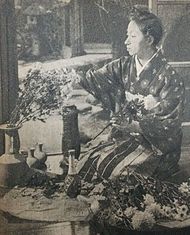 1954年― 吾妻一座渡米。 ニューヨークなど7つの都市で『アズマ・カブキ』を銘打った歌舞伎スタイルの舞踏劇を上演。その後 は、1956年まで欧米十数カ国・四十数都市で公演した途中の出来事である。
1954年― 吾妻一座渡米。 ニューヨークなど7つの都市で『アズマ・カブキ』を銘打った歌舞伎スタイルの舞踏劇を上演。その後 は、1956年まで欧米十数カ国・四十数都市で公演した途中の出来事である。
1954 - The Azuma troupe travels
to the United States. They perform a kabuki-style
dance drama entitled "Azuma Kabuki"
in seven cities, including New York. after
that, they performed in over 40 cities in
over a dozen European countries until 1956.
This happened during the time when I was
bored and was spending my time in idleness.
Three years later, I decided that I wanted
to write "good" novels rather than
rhetorical novels.
ⅱ、 有吉探偵のバランスシート Detective
Ariyoshi's Balance Sheet
※バランスシートとをアメリカ式会計学で理解すると貸借対照表にあたり、つまり有吉佐和子資産という意味である。
1957年春 『新新潮』タテの会メンバー(芦田均、谷崎潤一郎、安部能成、大宅壮一、今東光、曾野綾子、有吉佐和子)たちが山王下の某料亭で
会合した。
・今東光が有吉にスピーチを求めた。これは彼女にとって負の資産だった。・私のスピーチを聞いていたNHKの岩崎氏に「私だけがしっている」という
推理番組に出演した。これは彼女にとっての資産だろう。・・・・・・これが当時の有吉佐和子の人脈だった。
※芦田 均 外交官を経験後政界入り、軍国時代にリベラリストとして自由党に関わり民主党を結成後芦田内閣を首班。
In the spring of 1957, members of the Shinshincho
vertical group (Ashida Hitoshi, Tanizaki
Junichiro, Abe Yoshinari, Oya Soichi, Kon
Toko, Sono Ayako, and Ariyoshi
Sawako) met at a certain restaurant in Sannoshita.-
Toko konasked Ariyoshi to give a speech.
This was a negative asset for her.・Ms. Iwasaki
of NHK
, who had listened to my speech,
appeared on a mystery show called "I'm
the only one who knows." This must be
an asset for her.It were Sawako Ariyoshi's
network at the time.
ⅲ、 失礼ですが先生のご本職は? Excuse
me, but what is your main occupation?
・NHKの探偵番組にレギュラー探偵役で出演していた頃テレビの視聴者は私を小説家とは知らなかった。
「私だけが知っている」クイズ番組1957年~1963年善269回
番組前半にサスペンスドラマを見せ、公判では徳川夢声の探偵局長、有吉佐和子、江川宇礼雄、池田弥三郎らの探偵局員が真犯人を推理する。
山内雅人が「結論を急ごう」と言って犯人の手口を明かしていた。有吉佐和子(72)-(84)(86)-(88)(90)-(94)(96)-(99)(102)、
問題は
戸板康二、鮎川哲也、笹沢佐保、夏樹静子、島田一男、土屋隆夫、藤村正太、新章文子
・私の小説の読者は小説のイメージが壊れるのでテレビ出演は辞めろといった。
・テレビと小説のユーザの感覚の違いを知った。
・ひつびとはテレビと小説の評価の基準や舞台も違うことを理解できない。
When I was appearing as a regular detective
on an NHK detective show, television viewers
didn't know that I was a novelist.
-Readers of my novels told
me to stop appearing on TV because it would
ruin the image of the novels.
I learned the difference in perception between
TV and novel users.
People fail to understand
that the evaluation standards and settings
for television and novels are different.
ⅳ、 ヒルマは手持無沙汰の作家生活 The
life of a writer is a bore in the daytime
・私の本音は、深夜が執筆時間の私にとって太陽の照っている午後は閑でしょうがない。
To be honest, since I write late at night,
I feel bored during the sunny afternoons.
ⅴ、 私はマスコミを忘れない I remember Media.1959
・しかし、3年たてば3つになるというたとえがある。
・私の作品を読んでいる人のために、私は作品を向上させなければと思ったのが1958年の初めであった。
1960 『祈祷』 1959『江口の里』 1958『人形浄瑠璃』
・1959『紀ノ川』は、ヒントで書いたり、異常な舞台設定や、特異な事件の展開で小説をつくるのはやめて、筆の力だけにたよって
女の命を書いてみよう。ひょっとすると私の身分では不相応に贅沢な仕事かもしれないけれど、やれるだけのことをやってみよう。
そうゆう気だった。
However, there is an old saying that in three
years there will be three.
It was early in 1958 that I realized I needed
to improve my work for the benefit of those
who read it.
- For the 1959 novel "Kinokawa,"
I decided not to write based on hints, or
to create a novel with an unusual setting
or
a unique turn of events,
but to write about the life of a Wakayama
woman using only the power of writing.
(since 1959)
ⅵ、 おみやげは買えませんが・・・・・・ You
can't buy souvenirs
・『私は忘れない』1959年(昭和34年)朝日新聞夕刊に連載された作品を1冊にまとめ1969年新潮社から改版された作品。
鹿児島県の離島である黒島が舞台。戦後の急成長期、都会の人々は大衆消費文化にいそしみ、華やかな芸能や文明の利器の登場により、
豊かさを享受していた。
一方で同じ国でありながら僻地では電気はおろか、情報や衣食住の物資も滞ることが日常であった。
主人公万里子が遭遇した人々、出来事の連なりがとても興味深い。女性が男性の従属物であった時代に女性が自分自身であることについて
多くの作品を手掛けている有吉さんだが・・・・・・
阪西志保(1893年に横浜から小樽に入植した両親の子として1986年に生まれた。)にロックフェラー財団の奨学金でニューヨーク
に誘われたのでOKした。 (アンドリュー・カーネギーの著書に影響を受け、ジョン・ロックフェラーにより1913年に設立された。)
従って、ニューヨークでは、学問に専念して日本には原稿を送らないという基本態度を維持するつもりなのでひと月分の生活費は
250ドル(1ドル=360円)なのでおみやげは買えません。
"I Will Not Forget" is a collection of works that were serialised
in the Asahi Shimbun evening edition in 1959
(Showa 34)
compiled into a single volume
and revised by Shinchosha in 1969.
The story is set on Kuroshima,
a remote island in Kagoshima Prefecture.
During the period of rapid growth after the
war,
people in the city were absorbed
in mass consumer culture and enjoyed prosperity
with the advent of glamorous entertainment
and modern conveniences.
Meanwhile, in remote areas, although it was
the same country, it was common for electricity,
information
and the necessities of food,
clothing and shelter to be cut off. The people
that the protagonist Mariko encounters and
the sequence of events are
very fascinating. Ariyoshi has written many
works about women being themselves in an
era when
women were subordinate to
men, but...
I was invited by Sakanishi Shiho (born in
1986 to parents who had moved from Yokohama
to Otaru in 1893) to New York
on a scholarship from the
Rockefeller Foundation, so I accepted. (Influenced
by Andrew Carnegie's writings, the foundation
was established in 1913 by
John D. Rockefeller.) Therefore, in New York,
I intend to devote myself to my academic
studies
and maintain my basic stance
of not sending any manuscripts to Japan,
so my monthly living expenses will be $250
(1 dollar = 360 yen),
which means I won't be able
to buy any souvenirs.
・芥川賞残念会 Akutagawa Prize Regret Party (1958)
芥川賞とは、文芸春秋社内の文学振興会によって選考がおこなわれ、賞が授与される。 芥川龍之介の友人である菊池寛が1935年に直木賞と
ともに創設し年2回発表される。
・大江健三郎氏の激励会で、「落選文士」と言われ・・・・・・わたしが、切実に芥川賞をほしいと思い出したのは、そのとき以来である。
The Akutagawa Prize is selected and awarded
by the Literary Promotion Committee within
Bungeishunju.
It was established in 1935
by Kikuchi Kan, a friend of Akutagawa Ryunosuke,
along with the Naoki Prize,
and it is announced twice a
year.
・At a pep rally for Ohe Kenzaburo, I was called
a "failed writer"...and it was
from that moment on that I remembered how
much
I wanted to win the Akutagawa
Prize.
・幸せな仕事 Happy work
『複合汚染』は消費者をターゲットに彼女たちがもっと農業について知るべきだと思って書いたが、思いがけず農村に多くの読者がいた。 I
wrote "Complex Pollution" with
the hope that consumers would read it and
learn more about agriculture,
but unexpectedly it found
many readers in rural areas.
歸園田居 Return to the Garden 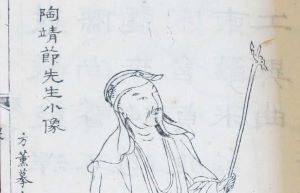
少無適俗韻 性本愛邱山
From a young
age, he had difficulty conforming to the
mundane world and had a natural love
for the natural
surroundings of hills and mountains.
誤落塵網中 一去三十年
By some stroke
of luck, I found myself caught up in the
entanglements of the mundane world.
Thirty years
have passed since I left my hometown.
羈鳥戀舊林 池魚思故淵
A bird tied up in a cage longs for the forest
where it used to live, and a fish kept in
a pond longs
for the river
where it used to live.
開荒南野際 守拙歸園田
I returned to
my rural home with the intention of cultivating
the southern plains
and preserving
my clumsy ways.
This poem by Tao Yuanming describes
how, rather than retreating to the countryside
or deep in the mountains
and isolating himself from the
world, his reputation as a hermit grew and
he began to interact more frequently with
local dignitaries.
In the poem, there is a reference to plowing
wasteland in the countryside, but this is
a stylized poetic expression of a life of
seclusion;
Tao Yuanming himself did not actually carry
a hoe or spade and work in the fields.
・炭を塗る―作家の生活 Painting with charcoal - the
life of an artist
・直腸周囲炎(東南アジアなどへの渡航歴、抗菌薬の服用歴、肛門性交の有無、最近の食事内容、放射線治療歴の有無、便培養検査など、
診断には病歴の確認が重要となります)という厄介な病気にかかった。この手術には5回もかかった。
・1979年 『有吉佐和子の中国レポート』を出版。
≪私が『中国レポート』を書き始めたとき、「あなたはもう二度と中国へ行かないという決意で書いていますんね」とか、「あれで中国は気を悪く
しませんか。大丈夫ですか」などの批評を頂いた。・・・・・・しかし、間もなく私も気がついたのだ。これまで日本で書かれてきた中国は、ベタ
ベタに褒めるか、滅茶苦茶に悪口を言うか、二通りしかなかった。「いいところと悪いところ」を両方見て、両方を書いたものがあまりにも少な
かったことに≫
・『最後の植民地』ブノワット・グルーを翻訳。
・『和宮御留』は私が女だから、正史でいつも取り上げられない世界を描いた。
・作家になって25年になって書いた『香華』は主人公の母親が一人歩きしてしまった。しかし、場合によっては、どうにも公表出来ないものになってしまい、
塗炭の苦しみに呻吟する。
I was diagnosed with a nasty disease called
periproctitis (it is important to check your medical history
to make a diagnosis,
including your travel history to
Southeast Asia, your history of taking antibiotics,
whether you have had anal intercourse,
your recent diet, your history of
radiation therapy, and stool culture tests). I had to have five surgeries for this
condition.
1979: Published "Ariyoshi Sawako's
China Report". <When I started writing
"China Report",
I received criticism such as, "You seem
to be writing this with the determination
never to go to China again"
and "Won't this upset China?
Are you sure?" ...But I soon realized
that up until now, China had only been written
in two ways in Japan -
either in overly praiseful terms
or in extremely bad terms.
There had been very few works that
had looked at both the "good and bad
points" and written about both.>
Translated "The Last Colony"
by Benoit Goulle.
"Black people have won their
independence, and workers have united. Ariyoshi
decided on the Japanese title with the idea
that today,
in the second half of the 20th century,
this is the "last colony" where
women who are oppressed, subordinated,
and isolated must be liberated."
『The Kazunomiya Diary』 depicts a world that
isn't always covered in official history
because I'm a woman.
"Koge"(I wrote this 25 years after becoming
a writer.) is a story about the protagonist's
mother that has taken on a life of its own.
However, in some cases, it becomes
something that cannot be made public, and
the protagonist groans in anguish.
・不要能力の退化 Degeneration of unnecessary
abilities
或る歌舞伎役者の妻は言った。「夫は役者以外のことは著しく退化している、数の勘定もだめになり、日常の振る舞いも女形になった。」
有吉は、もしかすると小説のせいで退化したら嬉しいことだ。と、思った。
The wife of a certain Kabuki actor said, "My
husband has regressed significantly in all
areas other than acting.
He has become bad at counting numbers,
and his daily behavior has become like that
of a woman."
Ariyoshi thought that it might be a
good thing if his husband regressed because
of novels.
・書ける! I can write! (After the birth)
フランソワーズ・サガンのエッセイの中に「妊娠した女は、ただ母という動物でしかない」とある。パリ在住の画家フランク純子さんに聞いた。
また、朝倉摂(1970年ロックフェラー財団で舞台美術を学ぶ)さんは「躰は別の制作に打ち込んでいるからだ」といった。
- 『更紗夫人』1962 『閉店時間』講談社、1962『雛の日記』文藝春秋新社、1962『脚光』1962『香華』、1962
(有吉さんが長女を身籠ったころの作品。)1963年11月、長女出産。8月に入ると書くことが苦痛になった。3枚書くのに今までの3倍
時間がかかった。
出産後から半年で書けるようになった。
In an essay by Francoise Sagan, she
wrote, "A pregnant woman is nothing
more than an animal called a mother."
I asked Paris-based painter Junko Frank
about this. <BR> Also, Setsu Asakura
(studied stage design at the Rockefeller
Foundation in 1970)
said, "Because her body is devoted
to another production."
In November 1963, my first daughter
was born. In August, writing became a pain.
It took me three times as long to write three
pages
as it had before.I was able to write
six months after giving birth.
・三人の女流作家(中国) Three Women Writers
(in China)
① 馮 鍾璞 Feng Zhongpu
1957年の「百家斉放百家争鳴」時、『紅豆』を発表。そのことで、「右派文士」と判断され1959年以降河北省の農村で労働改造をおこなう。
1984年に中国作家協会理事に選出される。
・万里の長城へ向かう車の中で、私と彼女は二人だけで通訳抜きで二人だけの会話ができた。
Feng said:「Old China had Noting・・・・・・」 古い中国にはなにもなかった。
・Mrs.. Feng talked about the female
wrestler.
別の車に乗っていた、井之 靖、平野 謙両氏は、それにはさまざまな言い伝えがあるといった。中国の作家たちは、「専制君主王」が
国民に「強制労働」を課したときに生まれてきた「人民」の「抵抗」を物語る寓話と聞かされ、馮さんの美しき悲劇とは異なっていた。
・中国で漢字の略字の話をした。 「簡体字」 1949年10月に中華人民共和国が建国され、1951年に文字改革を指示した。シンガポール、
マレーシアでも使われている。
1,Feng Zhongpu
During the "Hundred Schools Rallying
Together" event in 1957, he published
"Hong Beans."
Because of this, he was deemed a
"rightist writer" and from 1959
onwards he carried out labour reform in rural
areas of Hebei Province.
In 1984, he was elected director
of the China Writers Association.
-On the car ride to the Great Wall,
She and me were able to have a conversation
just the two of us, without an interpreter.
Feng said: 「Old China had Noting・・・・・・」
Those words were shocking to me.
・Mrs. Feng talked about Maukiyozhiyo
Inoue Yasushi and Hirano Ken, who were standing
in another car, said there were various legends
behind the story.
Chinese writers had been told it was
an allegory about the "resistance"
of the "people"
that arose when a "tyrant king"
imposed "forced labor" on the people,
which differed from Feng's beautiful tragedy.
What they have in common is that they both
cried over the Great Wall..
② 謝冰心 Xie Bingxin
文化大革命で批判され、1969年から(私刑施設)に入れられた。1970年に五七幹部学校に入れられたが、米中国交正常化により開放される。
その後外交文書の翻訳に携わる。
・謝冰心曰く「中国の5億の農民は開放後、平等の教育を受けるようになって一斉に文字を讀んだり書いたりし始めたので紙が不足した」
・開放前の中国では、実に多くの人が人間以下の生活を強いられてきた。生活の最低線が、開放後の上昇率がどれだけすごいことか昔の中国を
知らない者にとっては驚くべき事実である。
1、Xie Bingxin
She was criticized during the Cultural Revolution
and was put in a lynching facility in 1969.
She was sent to the 57 Cadre School in
1970,
but was released when diplomatic relations
between the United States and China were
normalized.
She then became involved in translating
diplomatic documents.
Xie Bingxin said, "After the liberalization
of China, 500 million peasants received equal
education and began to read and write at
the same time,
which led to a paper shortage."
Before the opening up of China, many
people were forced to live subhuman lives.
For those who do not know the China of the
past,
it is astonishing how dramatically the
minimum standard of living has increased
since the opening up of China. ーby ariyosihi
③ RuZhijuan(1925~1998) Aru,
Chu Xu,
Ru Zhijuan(1925年9月13日 - 1998年10月7日)、ペンネームAru、Chu Xu、
1947年に中国共産党に入党し、1950年に監督の王小平と結婚して、1955年に南京軍区レパートリー団から上海に移り、
「月刊文芸」の編集者として働いた。
・王 小平 該当者ではないかも、
2019年8月、中国サッカー協会の規律委員会のディレクターに再選された
2023年3月24日、湖北省規律検査監督委員会のウェブサイトによると、
中国サッカー協会規律委員会の王小平主任は重大な法律違反の疑いがあり、中央規律検査委員会の規律検査監督グループと国家体育総局の
国家監督委員会、湖北省監督委員会の監督と調査を受けました。
盧志娟(ルー・ジージュアン、1925年9月13日
- 1998年10月7日)は、ペンネーム「アル」と「チュシュ」で、浙江省紹興市杭州市生まれの現代中国の作家です。
代表作に『高いポプラの木』『ユリ』『静かな産科病院』『編集を間違えた物語』など。
Ru Zhijuan は 1925 年に杭州で生まれました。
幼い頃に両親を亡くし、母方の祖母とともに上海へ行き、手工芸をして生計を立てていたが、11歳になるまで小学校には通わなかった。
Lu Zhijuan (September 13, 1925 - October 7,
1998),
pen names "Ar" and "Chushu",
was a contemporary Chinese author born in
Hangzhou, Shaoxing, Zhejiang Province.
Her major works include "Tall Poplar
Trees", "Lilies", "Quiet
Maternity Hospital" and "Misedited
Tales". Ru Zhijuan was born in Hangzhou
in 1925.
After losing her parents at a young age,
she went to Shanghai with her maternal grandmother,
where she made a living by doing handicrafts,
but did not attend primary school until
she was 11 years old.
・野上先生の生活と文学 The Life and
Literature of Professor Nogami
野上弥生子 (1885年~1985年)夏目漱石漱石の紹介で『縁』を発表する。以来、写実主義に根差す作風と、理知的リアリズムで市民の良識を描く。
1906年に漱石門下の野上豊一郎と結婚、1907年『ホトトギス』に『縁』を発表した。漱石は野上に「漫然として年をとるべからず文学者として年
をとるべし」という言葉をおくると、野上はこれを「生涯のお守り」にしていた。
1906年のハンガリー動乱に際しては、「ロシアといえば第二次戦争後斬くできあがったハンガリアの人民団体が権力を逆転しようとするのを、乱暴に
引き戻そうとしたのでと、ソ連を養護 『1957 世界』また、動乱で発生した難民を救助しようとした(日本ハンガリー救援会の活動を、「事件が起こるまで
「ハンガリー」の場所すらしらなかった者が、「にわかに地球儀を買いに走り、また、にわかに募金活動をはじめだす光景に複雑な思いがすると、批判。
(小島亮 『ハンガリー事件と日本』)
・井上靖語録 Yasushi Inoue's Sayings
「有吉さん、もう十年我慢しなさい。僕だって十年我慢しました」
「これからは売れない小説をお書きなさい。それが一番ですよ」
この言葉を信じ、『恍惚の人』を書いたが爆発的なヒット作となった。
・Miss Ariyoshi, please endure for another
ten years. I also endured for ten years.
・From now on, write an unpopular novel.
That's the best thing.
Believing these words, I painted the image
of an elderly man in a state of senility,
with the theme of "The Ecstatic Man."
It unexpectedly received a great response
and criticized the shortcomings of society
regarding welfare for the elderl
・美しい男性
61年6月28日、亀井勝一郎を団長とする日本文学代表団
・(1907-1966)函館生れ。東大美学科在学中「新人会」に加わり大学を中退。1928(昭和3)年、三・一五事件で検挙される。
保釈後日本プロレタリア作家同盟に所属するが転向して、1935年同人誌「日本浪曼派」を創刊。1943年『大和古寺風物誌』を刊行。
戦後は宗教的立場から文明批評を試み、1950年『現代人の研究』で読売文学賞受賞。(中宮寺の弥勒菩薩のような人)
・亀井勝一郎氏が1960年5月、日本文学代表団の副団長として訪中し、中国政府高官に会見した時、戦前の日中関係について、当時の陳毅副首相兼外相
から次の様な発言があった。「日本軍国主義の弾圧を受け投獄された亀井先生が、日本軍国主義が中国を侵略したことを永久に忘れないとおっしゃる。
半世紀の歳月がたった今でも先人の言葉は心に響く。」張 平(日本エネルギー経済研究所 主任研究員) 2012年9月5日
・新中国成立後、「党の仕事の重心は社会主義建設に変わる」と毛沢東は宣言した。
復興建設のために、米国とソ連のどちらの援助を求めるかを選択する際、革命的イデオロギーが強く残っている当時の共産党はソ連を選んだ。
ソ連の「集団農場」建設モデルに刺激された毛沢東は、革命的な手法で国家建設に応用して大躍進政策を推進したが、失敗。その後、
「継続革命論」を打ち出し、文化大革命を引き起こし、国内は混乱状態に陥った。
・党の方針が本当に経済建設に転換したのは、1978年、鄧小平が打ち出した改革開放政策である。この政策の特徴は、GDP成長率最優先であり、
経済の高度成長とともに環境破壊、拝金主義と官僚の腐敗の横行、貧富の格差が拡大した。こうした経済・社会問題に加え、言論の自由に対する干渉
などが国民の不満を招き、政治改革を要求する学生たちによる民主化運動が起き、天安門事件につながった。
・2007年10月の中国共産党の第17回全国代表大会で、胡錦濤総書記の「科学的発展観」が党規約に加わるとともに、「調和社会の構築」が党の重要な目標
に位置づけられた。
・一党独裁の政治体制は変わらないが、共産党は「執政党」(政権党)としての責任を認識し、如何に長期的に政権が維持できるかを真剣に考え、環境問題、
貧富の格差、腐敗の取り締まり、国民の福祉、社会の安定を重視するように変貌してきた。
・筆者は二十数年前、日本に来た当初、日本の民主主義制度は何と素晴らしいのかと思い、祖国の中国もいつか民主化してほしいと切望していたが、
二十数年住んでいるうちに日本の民主制度の欠点も見えるようになってきた。
・40年前、東西勢力の消長変化の中、中日両国の政治家は東洋の知恵といわれる「求大同、存小異」の精神で、いろいろな困難を克服し、国交正常化を実現
させた。40年来、両国の経済関係はますます緊密化して、お互いの国民に大きな利益をもたらしたが、摩擦も絶えなかった。摩擦は中国と日本だけではなく、
中国と米国、中国と欧州にも、形が違うが、様々起きている。摩擦への対応策はさまざまであるが、試練と挑戦を受けながら、経験を蓄積し、中国自身が変化し、
世界も変化している。
(日中国民勘定の変化をどうみるか 張 平 )2012年9月5日
When Kamei Katsuichiro visited China in May
1960 as the deputy leader of a Japanese literature
delegation
and met with high-ranking Chinese government
officials, Chen Yi, who was then Vice Premier
and Foreign Minister,
made the following remarks about prewar
Japan-China relations:
"Mr. Kamei, who was oppressed and imprisoned
by Japanese militarism, says he will never
forget that Japanese militarism invaded China.
We want to forget. This is a good thing. Conversely,
if we say we won't forget and the Japanese
side wants to forget, that would be a tragedy.
Even after half a century, the words
of our predecessors still resonate in our
hearts."
・After the founding of the People's Republic
of China, Mou TakTong declared that
"the center of gravity of the party's
work will shift to socialist construction."
When faced with the choice of whether
to seek aid from the United States or the
Soviet Union for reconstruction and construction,
the Communist Party
,which still had a strong revolutionary
ideology at the time, chose the Soviet Union.
Inspired by the Soviet model of "collective
farm" construction, Mao Zedong applied
revolutionary methods to nation building
and promoted the Great Leap Forward,
but it was a failure.Next, he put forward
the "Theory of Continuing Revolution,
" which triggered the Cultural Revolution and plunged the country into chaos.
The party's policy truly shifted to economic
construction in 1978 with the Reform and
Opening Up policy launched by Deng Xiaoping.
Along with rapid economic growth came
environmental destruction, rampant materialism
and bureaucratic corruption,
and a widening gap between rich and poor.
In addition to these economic and social
problems, interference with freedom of speech
led to public discontent,
and a democratization movement led by
students demanding political reform led to
the Tiananmen Square incident.
At the 17th National Congress of the
Communist Party of China in October 2007,
General Secretary Hu Jintao's "Scientific Outlook on Development"
was added to the Party Constitution,
and "building a harmonious society" was positioned as an important goal
of the Party.
Although the one-party political system
remains unchanged, the Communist Party is
aware of its responsibility as the ruling
party
and is giving serious thought to how
it can maintain power in the long term.
It has transformed to place greater emphasis
on environmental issues, the gap between
rich and poor, crackdowns on corruption,
the welfare of the people,
and social stability.
When I first came to Japan more than
20 years ago, I thought that Japan's democratic
system was wonderful and I hoped
that my home country, China, would also
democratize one day. However, after living
here for more than 20 years,
I have begun to see the shortcomings
of Japan's democratic system.(How to interpret
the changes in the Japan-China national accounts,
Zhang Ping)
September 5, 2012
・火野先生の想い出 Memories of Professor
Hino
1960年カナダ大使館で萩原大使と火野葦平先生の話をした。
火野葦平は1907年~1960年の小説家である、(睡眠薬服用した自殺)甥に中村哲(カカ・ムラト)ががいた。
「糞尿譚」「麦と兵隊」「土と兵隊」「花と竜」などがある。
萩原大使と話ていたとき、私はショックをうけたそれは大使館に火野の死について電話であった。
In 1960, I spoke with Ambassador Hagiwara
about Professor Hino Ashihei at the Canadian
Embassy.
Hino Ashihei was a novelist from 1907 to
1960 (he committed suicide by taking sleeping
pills). His nephew was Nakamura Tetsu (Kaka
Murat).
Hino wrote works such as "Fun Nixyou Tann"
"Wheat and Soldiers," "Earth
and Soldiers," and "Flowers and
Dragons."
While I was talking with Ambassador Hagiwara,
I received a shocking phone call from the
embassy about Hino's death.
Mysterious Medical Records
・ルポルタージュ① 北京の料理屋 [Reportage ①] <B>Beijing Restaurant</B>
※「北京の料理屋」は単行本『有吉佐和子の中国レポート』p、42に詳しい。
また、「愚公移山」というのが沙石硲の村人のスローガンであったらしいことを知る。
(愚公という90歳の老人のお話で、大行と大屋という玉山に家の出入りを塞がれていたので、家族でこの山を削りはじめた。この様子を知った
「天帝」が二つの山を取り除いてくれたというお話)
・今回の旅の目的は、人民公社行きにあった。
・1960年代後半から70年代前半、文化大革命運動を推進した4人組(江青、張春橋、姚文元、王江文)を華国鋒が倒してから、中国はようやく
暗黒の10年から立ち上がり、英語の話せる人は英語で、堂々と「どこから出てきたか」話す自由が与えられたのだ。
※For more details on "Restaurants
in Beijing," see the book "Sawako
Ariyoshi's China Report," p. 42.
Also, it seems that "The Old Man
Moves the Mountain" was a slogan used
by the villagers of Shashikhan.
(This is a story about a 90-year-old
man named Gu Co. Two mountains were blocking
the way to his house,
so he and his family started carving
them down.
When the "Heavenly Emperor"
heard about this, he removed the two mountains.)
.jpg)
・However, the purpose of this trip was
to go to the People's Commune.
・From the late 1960s to the early 1970s,
when Hua Guofeng overthrew the Gang of Four
(Jiang Qing, Zhang Chunqiao, Yao Wenyuan,
and Wang Jiangwen) who had driven the
Cultural Revolution movement, China finally
emerged from the Dark Decade and those
who could speak English were given the
freedom to speak openly in English about
where they came from.
いとおしい時間 Precious time
私と歌舞伎 ― ゴージャスなもの
・私は4歳の時に外国に行き、12歳までジャバで育った。今はインドネシアだが当時はオランダの植民地であり、原住民の被搾取と忍従の歴史
の上に白人社会が天国のように構築されていた。しかし、実際、当時からジャバで最も隠然たる力を持っていたのは華僑だった。
・東京は一面の焼野原で、疎開先から帰った時、これから日本人は、ジャバ人のように白人にこき使われて暮らすことになるのだろうかと不安だった。
だからインドネシアの独立宣言は他人事とは思えなかった。私もスカルノのように民族意識に燃え立ち。だんだん反米的な思想を育てていった。
かっては米英的だといって、教師に睨まれていた私だったのに。
.
Me and Kabuki - Gorgeous
・I went abroad when I was four years old,
and grew up in Java until I was twelve. It
is now Indonesia, but at the time it was
a Dutch colony,
and the white society was built like
a paradise on a history of exploitation and
submission of the indigenous people.However,
in reality,
it was the overseas Chinese who held the
most hidden power in Java even back then.
・I returned to Japan when I was 12 years
old, and one day my father took me to the
Kabukiza Theater to see "Fujimusume"
and "Harata Kanto,"
and I was overwhelmed by the splendor
and grandeur of the stage. When we lost the
war,
I felt strangely nostalgic for the teacher
who had beaten me. People who have never
known a country other than Japan probably
thought
that they would simply do as the government
told them and win against the "devilish
Americans and British."
・I still believe that Kabuki is the only
gorgeous thing that we can be proud of to
foreign countries
伝統美への目覚め ー わが読書時代を通して Awakening
to Traditional Beauty - Through my Reading
Days
・In 1941, as a fifth-grader at Java Primary
School, I returned to my dream country of
Japan, but...
・横浜正金銀行に勤める父のもと私は、少額年生のころから『漱石全集』の禅味や哲理の理解できぬまま読んでいた。しかし、苦沙美先生や宗近君とは
親しくなった。
・子供時代は細くて、頭でっかちで痩せた嫌な子供だった。
・帰国すると読書で想像したた日本と異なっていたので、浦島太郎のようにしばらくポカンとしていた。
・歌舞伎舞台に駘蕩している豊かさと様式美に強烈な感銘を受け、ジャバのプルポドールの旧跡を思い出した私は、心の中で釈迦の一代記を壁や会談階段に
彫りこんだ石造に重ね合わさったのである。
My father worked at the Yokohama Specie Bank, and from the time I was a teenager I read
the Complete Works of Soseki without really
understanding
its Zen flavor or philosophical principles.、However I
became close friends with Professor Kushami
and Munechika.As a child, I was a skinny,
ugly, skeletal
child with only knowledge.
When I returned home, the Japan I had imagined
from my books was different, so I was stunned
for a while, just like Urashima Taro. However,
I was deeply
impressed by the richness and beauty of
the style that permeated the Kabuki stage,
and it reminded me of the ruins of Pulpodor
in Java, and in my mind
I imagined the life story of Buddha carved
into the stonework on the walls and the meeting
staircase.

・有吉佐和子の旧家の「伝統としての『紀ノ川』
・大東亜戦争が始まると、父は東京に残り母と私と兄妹は母の実家に疎開して終戦後二年間和歌山で暮らした。
・和歌山ではバレーボールに夢中になり、読書以外に学ぶことがあるものに気が付く。そして、田舎の生活の中で、祖母と母、母と私、私と祖母、という
女三代の相関について、興味深く観察した結果、「隔世遺伝」という言葉を、妙に生々しく実感した。 思うに、母には巨怪な生物の中に凄む煩わしさが、
分かっていたのであろう。だから、合理主義や近代主義を振りかざし、振り回しでもしなくては、その患わしさから逃げ出ることができなかったのであろう。
そんな母のおかげさまで、私は旧家と巨怪な生物に対する煩わしさを抱かず祖母と接しられたのだろう。
"Kinokawa" as a tradition of the original family
of Sawako Ariyoshi
・When the Greater East Asia War began,
my father remained in Tokyo while my mother,
my siblings and I evacuated to my mother's
parents' home
in Wakayama and lived there for two
years after the war ended.
・In Wakayama, I became engrossed in volleyball
and realized there were other things to learn
besides reading.
And as I lived in the countryside,
I observed with interest the relationships
between three generations of women
- my grandmother and my mother, my
mother and me, and myself and my grandmother
-
and as a result, the phrase "transgenerational inheritance" struck me as oddly vivid.
I think my mother understood the terrible
troubles that exist within these monstrous
creatures. And so she had to wield rationalism
and modernism,
even if it meant waving them around,
in order to escape from those troubles.
Thanks to my mother, I was able to
interact with my grandmother without feeling
any trouble towards our old family and these
monstrous creatures.
・有吉佐和子の高校、大学のころ
・高三の夏、一〇〇冊に近い本(翻訳、古典、戯曲、現代小説)の意図を読み込んで夏休みの研究とした。
・大学生になると、やたらに興味を持つ性癖から脱却、南画史に関する資料、歌舞伎研究の専門書、英文の戯曲が主であった。
・乱読の頃、八割を占めた小説には興味を失ってきたが、記憶の中で残った作品の一つに岡本かのこの作品がある。
岡本かのこー『閉店時間』松野紀美子のテープ・ライブラリー
・日本の歌舞伎にみられる陰惨は、オニールやクリストファー・フライの作品に比べると温情があった。
・鶴屋南北の歌舞伎を見詰めて、大乗哲学が底流する岡本かのこの小説をてにして、古典文学を読み始めた。
・Sawako Ariyoshi in high school and
college
・During the summer of my third year
of high school, I spent my summer vacation
researching the meanings of nearly 100 books
(translations, classics, dramatic literature,
and modern novels).
・I have since lost interest in novels,
which made up 80% of the books I read during
the time when I was a voracious reader,
but one of the works that has remained
in my memory is this one by Okamoto Kanoko.
(Kanoko Okamoto - "Closing Time"
Kimiko Matsuno's Tape Library)
・The gruesomeness of Japanese Kabuki
is more benign than the works of O'Neill
and Christopher Fry.
・I watched the Kabuki performances of
Tsuruya Namboku, always carried Okamoto Kanoko's
novels with me, and began reading classical
literature.
・(Okamoto Kanoko's work is based on
Mahayana philosophy)
・有吉佐和子の出版社に勤務したころ
・「古い」という言葉には、自分と繋がる人格を見返るときにでてくる言葉だ。
・戦後10年経って、旧来の陋習は打破され、重い殻は砕かれ、大人たちは自分たちの苦渋を後進には繰り返さすまいと、私たちに寛容だった。しかし、
彼等自身の手から生み出し、われわれに譲渡すべきものは何も持たない。彼らが新しいと述べたものはわれわれはなんの苦労もなく自分たちのもの
にしている。
・私は壁の向こうに置き去られた遺産が気になる。勿体なくて仕方がない。旧時代の残滓を生活に持たないわれわれは遺産を担う力がある。
・ときどき外国の歌舞伎ファンのなあには、専門的な研究科があり、彼等から「近代への批判」を聞けた。
・祖母が脳溢血で倒れると、私は彼女の枕元で『増鏡』を朗読した。ー『紀ノ川』出。
(『増鏡』は大鏡・今鏡・水鏡とあわせて四鏡とよがれている。後鳥羽天皇の誕生一一八〇年から後鳥羽天皇の鎌倉幕府打倒一三三三年までの
約150年間を描いている。)
・隔世遺伝という言葉を、私は信じている。読書によって、昔の人たちと親しみ、私は伝統の断絶を防ぎたい。
・When Sawako Ariyoshi worked at a publishing
company
・The word "old" comes up when
looking back at the personality that is connected
to us.
・Ten years have passed since the end
of the war, and old habits have been broken
down, heavy shells have been shattered,
and the adults have been tolerant of
us, not wanting to repeat their suffering
on the children.
However, they themselves have created
nothing and have nothing to give to us.
Whatever they say is new, we have made it ours without any trouble.
・I am concerned about the heritage that
has been left behind on the other side of
the wall.
It is such a waste. We who do not have
remnants of the past in our lives have the
power to carry on this heritage.
・Occasionally, foreign Kabuki fans would
come to the specialized research departments
and hear their "criticism of modernity."
・When my grandmother collapsed from
a cerebral hemorrhage, I read 『Masukagami』」
to her at her bedside.
(Masukagami is known as one of the
Four Mirrors, along with Okagami, Imakagami,
and Suikagami.
It covers a period of about 150 years
from the birth of Emperor Gotoba in 1180
to his overthrow of the Kamakura
shogunate in 1333.)
It is described in detail in the
"Taiheiki"
However, volume 22, which records the period after
Emperor Godaigo's death, seems to have been
missing in the 1500s.
It is speculated that it was deleted
because it contained inconvenient information
about the Southern Court and
the Muromachi Shogunate.
・I believe in the word atavism.
By reading, I can get closer to people
from the past and I want to prevent the loss
of traditions.
・青春三音階 ー Youth 3-tone scale 120p
・耽美的傾向、それは私が幼児のころの体験から出来あかったものだ。夏目漱石から菊池寛の小説にいたるまで小学年三年生までにほとんど読破した。
だから愛とか恋、人生、青春といった言葉は書籍から得た知識で食傷していた。従って、私はこのころに年増の考え方を築き上げていた。
・わたしの耽美主義が影響して、美男美女以外の恋愛を読んでいなかった。
・バレーボール部、それは私が女学校に通った頃の話である。バレーボールは私の考えたり、理屈をこねたり、というこれまでの習慣を捨てさせた。そして、
勉強よりも大切なものがあることに気づかせた。
・疎開から帰京した時、私はめっちゃくちゃに明るくなっていた、そのことがどのくらい徳なのかを実証していた。この時の様子を音階で表現すれば三オクターブ
は跳ね上がったといえる。
・My aesthetic tendency was formed from
my experiences as a child. By the time
I was in the third grade of elementary
school, I had read almost everything from
Natsume Soseki of the Meiji period to Kikuchi
Kan's novels.
Therefore, So, I was fustrated of words
like love, romance, life, and youth because
of the knowledge I had gained from books.
Therefore, I had developed the mindset
of an old man around this time. Because
of the influence of aestheticism,
I only read romance stories about beautiful
men and women.
・The volleyball club, that's when I
was in a girls' school. Volleyball made me
let go of my old habits of thinking and reasoning.
It also made me realize that there are things
more important than studying.
・When I returned to Tokyo after evacuation,
I was incredibly cheerful, proving how virtuous
that was.
If I were to express this state of
mind in musical notation, I would say it had jumped three octaves.
≪They say that depending on your mindset,
you can stay in your youth forever,
but when our bodies become weak,
our youth is sad.
I am entering the latter stages of
my youth.
It is too early to grow old, but
I would like to
reflect on the imbalance between
my mind and body during my entire
and middle years of youth and live
my days without regrets from now on.
And I would like to play a rich symphony
that covers both low and high notes, rather
than a bland etude for the midrange.≫
・凧あげ Fly a kite in the sky 129p
・1939年パタビヤ小学校2年生のころ、1月1日はジャバで過ごしていた。
・正月は私は父も母も交えて校庭に集合し、国家を斉唱しながら日の丸を揚げていた。青空高く、真綿のような白雲が流れる中に日の丸が翻る様子を
眺めると、ジャバに住んでながら日本人に宿っている情緒や季節感を共有している気持ちがした。
・1941年2月帰国したが、12月8日に「ニイタカヤマノボレ」の号令のもとで真珠湾攻撃がおこなわれ、私は自粛政策に会い念願の振り袖を新調して貰えなかった。
・小学5年の正月、父と上野の寛永寺坂で凧あげをした。凧は幼稚園入園前の弟にかこつけて買ってもらった。
・数えでいえば6歳になる姪のために平仮名のカルタも双六も買い整え、福笑いも楽しみたいが、しかし、これが大人の古典趣味からきたものなら、姪にとっては
大変迷惑であろう。
・とにかくわたしは凧あげが好きだ。
・in 1939, when I was in the second grade
at Pattabiya Primary School, I spent January
1st in Java.
・During New Year's, we would gather
in the schoolyard with our parents and raise
the Hinomaru flag while singing the national
anthem.
Looking at the Hinomaru flag waving
high in the blue sky with fluffy white clouds
floating by, I felt like I was sharing the
emotions
and sense of the seasons
that are inherent to Japanese people,
even though I live in Java.
・I returned to Japan in February 1941,
but on December 8th, the attack on Pearl
Harbor took place under the command of "Niitakayamanobore,"
and I was forced to endure a policy
of self-restraint and was unable to get my
long-desired new kimono, a "furisode."
・During the New Year holidays when I
was in the fifth grade of elementary school,
I flew a kite with my father on Kan'eijizaka
in Ueno.
My younger brother, who had not yet
started kindergarten, bought me the kite.
・I have bought a set of hiragana karuta
and sugoroku for my niece, who is six years
old by Japanese reckoning,
and I would like to enjoy Fukuwarai
as well,
but if this is something that comes
from an adult classical hobby, it will be
a huge nuisance for her.
・Anyway, I love flying kites.
・おひなさま Hina dolls 135p
・女の保守性は桃の節句が近づく度に、我が家では焼けてしまったひな人形の話がでる。
・祖母は私のために最高級のひな人形を買ってくれた。しかし、大人たちの自慢の材料の感があった。
・学生時代アルバイトの収入でひな人形を買い、机の上に飾った。
・嫂は戦争で焼け残ったひな人形を大切にしていた。その人形で姪たちが幸せそうな表情で遊んでいた。
・おひなまつりの人形は大人が雛自慢するのためのものではなく、『源氏ものがたり』なんかに出ている女の子がひなで遊ぶ為の人形である。
・Women's conservatism is such that whenever
the Doll's Festival on March 3rd approaches,
stories of the Hina dolls
that burned in the fire in our house
come up.
・My grandmother bought me the most expensive
doll, but it had the feel of something adults
would be proud of.
・When I was a student, I bought a Hina
doll with the money I earned from a part-time
job and displayed it on my desk.
・My brother's wife treasured the Hina
dolls that survived the war. My nieces looked
very happy as they played with the dolls.
・My brother's wife treasured the Hina
dolls that survived the war. My nieces looked
very happy as they played with the dolls.
・The dolls for Hinamatsuri are not for
adults to boast about, but are dolls for
the girls who appear in stories
such as "The Tale of Genji"
to play with.
.jpg)
・桜の花と想い出 ー お花見のこと Cherry
blossoms and memories - about cherry blossom
viewing 140p
・江戸時代時代
徳川幕府が生まれて初期のころは、木の廻りが5間もある糸桜の大木に、和歌を書いて花の下枝に吊るして賞翫していた。
3代目家光の頃になると、和歌や俳句の素養は無く川柳も作れない人々が、並木桜の下に集まり酒をがぶ飲みし、花見が洒落でも風流でも無くなり娯楽になる。
8代目吉宗の頃になると、花見の場所は寺や神社から離れて並木桜の下で楽しんだ。落語に『長屋の花見』『貧乏花見』を参照されたし。
①「井戸端の桜あぶなし酒の酔」② 「武士の紅葉にこりず女とは」 秋色女 作
①酔っ払いのせいで桜の花びらが散る ②酒の宴で武士に戯れかけられ不快なことだが、紅葉狩りで泥酔した武士につきあった女も愚かな人である。
Edo period
In the early days of the Tokugawa Shogunate, people would write waka poems on a large
Ito Sakura tree, which was 909cm in circumference,
and hang them from the blossoms on its
lower branches to enjoy.
By the time of the third shogun, Iemitsu, people who had no knowledge of waka or haiku
and could not compose senryu
gathered under the rows of cherry trees,
guzzling down sake, and cherry blossom viewing
became neither stylish nor elegant,
but just entertainment.
By the time of the eighth shogun, Yoshimune, cherry blossom viewing spots moved away
from temples and shrines and were enjoyed
beneath
rows of cherry trees.
① "The Cherry Blossoms at the Well,
the Drunkenness of Sake";② "The
Woman Who Doesn't Like the Autumn Leaves
of a Samurai" by ShushikiJixyo
① Drunk people cause cherry blossom petals
to fall.
② It is unpleasant to be flirted with
by a samurai at a drinking party, but the
woman who accompanied a drunken samurai on
an autumn leaf viewing trip is also foolish.
・祝うこと ー Celebrating 144p
日本の家庭の奥さんは、亭主の友人がやって来ると女中の代わりになり、息子の友人がやって来ると息子の部屋へお菓子を運び、奥さんの友達は居間で楽しむ
といったあり様なので、家庭には一家団欒の機会に乏しい。外国生活の長かった我が家では、理由をつけて月に1度赤飯を炊くいて祝う。
私の嫂はこんな風習に戸惑っていた。
祝うということは、いいことだ。祝われる者もいい気持ちになれるが、祝うものも実に豊だ、実に楽しい。兄貴たちの夫婦喧嘩の最中でも、弟の祝いには不祝儀面が
並べられない。たまに母と嫂の空気が嫌悪になっても、姪が幼稚園へ上がる日になれば、家中が微笑でそれを解決している。
まずいことが起こるとなにか名目を設けて祝うことをするのが我が家の解決策なのである。
私が大好きなキリスト教の行事では聖母披昇天の祝日と、十二月二十五日のクリスマス。我が家の嫂はクリスマス本来の祝い方を書いた記事を切り抜いて兄に
「この夜は早く帰れ、家族が一つ食卓に集まる日である。」とデモンストレーションをする。祝うことはいいことだ。家族和合の秘訣である。
Celebrating
In Japanese households, the wife acts as a
maid when her husband's friends come over,
brings sweets to the son's room
when the son's friends come over, and
the wife's friends enjoy themselves in the
living room, so there are few opportunities
for family get-togethers.
In my family, who lived abroad for
a long time, we make an excuse to cook the
sekihan once a month to celebrate.My older
sister-in-law was confused
by this custom.
Celebrating is a good thing. The one being
celebrated feels good, but the one celebrating
is also rich and fun. Even in the midst of
a marital dispute
between my older brothers, I can't bear
to show my condolences at my younger brother's
celebration.
Even if the atmosphere between my mother
and sister-in-law becomes unpleasant at times,
when my niece starts kindergarten, the
whole house resolves the issue with smiles.
My favorite Christian events are the Feast
of the Assumption and Christmas on December
25th.
My sister-in-law cut out an article about
the original way to celebrate Christmas and
demonstrated it to my brother, saying,
"On this night, you should come
home early and the family will gather around
the dinner table."
Celebrating is a good thing. It is the
secret to family harmony.
・赤い花 ー Red Flower 149p
岡本かの子の小説に『花は勁し』『河明り』がある是非ともご一読されたい。
花は赤く咲け・・・・・・私はジャバで暮らしたころを思い出し折りにつけ口ずさんでいる。白い花や淡色の花々には、それを認めないというのではないが、
四季の中で あるとき急に羽目を外して、別世界の色彩に遊んでみてもいいのではないだろうか。盛夏、着ているものも、しとどに汗を含んで、亜熱からの
逃避を願うときには白い花は魅力的だが、思い切って空を仰ぎ、太陽と同じように私たちも生命みなぎっていることができるとしたら、
赤い花はその強い色彩で私たちをいよいよ励まし力づけるだろう。若者ならば、私は後者を選ぶべきだと思っている。夏には。
☆彡季節には季節の花を
私がかってニューヨークで住んでいたころ、送られた花に花を長生きさせる薬がついていた。それを壷の中に混入すると花は10日でも20日でも
枯れなかった。それから帰国して菊の花をみるとニューヨークの花を思い出す。
やはり花は、季節が変わる度にふさわしい花の咲くほうがよい。9月は咲く花の数がすくなくとも9月の花を鑑賞したい。
Some of Kanoko Okamoto's novels that
I highly recommend are "Hanahatsuyosi"
and "Kawaakari"
Flowers bloom red... I often hum this to myself,
remembering my time living in Java.
It's not that I don't approve of white
and pale-colored flowers,
but I think it's okay to let loose at
some point in the four seasons and play with
the colors of another world.
White flowers are attractive in the height
of summer, when your clothes are drenched
in sweat and you wish to escape the heat,
but if you can look up at the sky and
feel as full of life as the sun, the strong
color of red flowers will encourage and empower
you even more.
I think that young people should choose
the latter. In summer.
・花 ー 待ち遠しい秋の色 Flowers - Long-awaited
autumn colors
☆彡White bush clover and "Hibiscus
monadelpha"
我が家の家の庭は、8月になると緑濃くなり萩のはなが咲く。酔芙蓉は八重咲のころ白から赤色になる。ススキも紫苑も水引草も吾亦紅も植えてから10年も経たない
から庭になじんでいない。サルトリイバラや紫式部、ウメモドキなどは生け花のように水を与えなくても色が変わらないので大歓迎である。








☆彡White bush clover and "Hibiscus
monadelpha"
When we lived in our house, the garden would
turn deep green in August and bush clover
flowers would bloom.Japanese Hibiscus sieboldii
changes
from white to red when it becomes double-flowered.
It has been less than ten years since we
planted the Japanese silver grass, asters,
water hyacinth and angelica tree,
and they have not yet blended in with the
garden. Plants such as Rosa serrata, Murasaki
Shikibu and Prunus umbellata are very welcome,
as they do not change color even without
watering, like ikebana.
☆彡Seasonal flowers in season
When I used to live in New York, the flowers
I received came with a medicine that would
make the flowers live longer.
If I mixed this medicine into the jar,
the flowers would not wither, even if they
were left in a jar for 10 or 20 days. After
returning to Japan,
whenever I saw chrysanthemum flowers, I
was reminded of the flowers in New York.
It is better for flowers to bloom in accordance
with the change of seasons. Even if there
are fewer flowers blooming in September,
I would like to enjoy the flowers of September.
・海の色 Color of the Sea 157p
・海・・・・・・それは私の敬愛している作家岡本かの子の作品の多くに「河」が主題として、武蔵野に生まれて多摩川のほとりに育った彼女の生い立ちを
物語っているが、私の「水」に関する物質は「海」である。
・1936年、冬、神戸から太平洋に滑りだす。
・1938年、小学校3年時、弟の出産の為帰国。
・1939年、父の居るスラバヤへと、再び赤道わ超える。
・1941年、最後の船旅、日本は非常時に突入していて、日本人の心に余裕が失われ始め、子供心に何か慌ただしいものが去来していた。しかし、
海というものは、感傷的なものでなく、ただただジャバと日本を繋ぐ実際的な道として感じていた。様々な色彩を抱合している海の実態が
女なら誰もが持つ母性に似ているため、私にとって永遠の憧れである。
The sea... Many of the works of Okamoto
Kanoko, an author I greatly admire, have
rivers as their theme, telling the story
of her upbringing,
having been born in Musashino and raised
on the banks of the Tama River,but for me
the substance associated with water is the
sea.
I have been on four cruises, starting
before I started elementary school and ending
in the spring before the start of the Pacific
War.
ⅰ In the winter of 1936, we set out
from Kobe into the Pacific Ocean.
Ⅱ In 1938, when I was in the third
grade of elementary school, I accompanied
my mother back to Japan to give birth to
my younger brother.
ⅲ In 1939 we crossed the equator again
to Surabaya, where my father was.
ⅳ During my last voyage, Japan was
in the midst of a state of emergency, and
the Japanese people began to lose their composure,
and a sense of urgency came and went
from my childish mind. However, the sea was
not something sentimental to me,
but rather something I felt was a
practical path connecting Java and Japan.
The sea, which embraces many different
colors, resembles the maternal instinct that
all women have,
and so the sea is something I will
always long for.
Kanoko Okamotoへのリンク


・新女大学より ―勤倹貯蓄を旨とすべし From
the New Women's College ― Be diligent,
thrifty and economical in saving money 161p
My mother was shocked by the content of my
manuscript.
「what is that?」
「It's rude for you, a waste of money, to
write that.」
「You're not fit to write it.」
My mother told the whole family and they
were shocked.But I have been writing.
As usual, when the solution and the main
question are presented
I decided to use an old school motto from
an old girls' school.
Ariyoshi took him as an example.
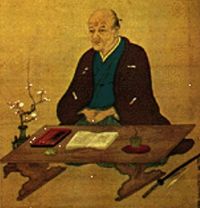 【The Wazoku Doji Kun is an educational treatise
written by Kaihara Mashiken in the Edo period.】
【The Wazoku Doji Kun is an educational treatise
written by Kaihara Mashiken in the Edo period.】
[wazokudoushikunn]
≪1,If you become a man's wife, you must keep
your husband's house forever.
If the wife's conduct is bad and she is unruly,
she will destroy the house.
All things frugal, hold down the money.
To dress according to one's social rank and
to eat and drink properly≫
I (Sawako Ariyoshi)want to use the human
precepts in the future.
工事中へのリンクBackground: Tokugawa and today
The author's response to this is.[wazokudoushikunn]I
say this to the women who have become the
wives of others.
But I'm single, so I don't fit into this
category.
Therefore, I develop my own theory.
One day I was at a round-table discussion.It
was also unwise to attend the discussions
without asking about the theme of the discussion.
As soon as I heard that the theme of the
round-table discussion was 'saving money',
I went a little pale.
I have spoken.
‘’I don't like to save money because I
like to spend it.I am a working woman.Diversions
include shopping and needlessly spending
money.
This is my best recreational activity.think
for myself
Savings are intended to help non-working
wives manage their husbands' money.I have
no right to speak, so please let me go home.‘’
The moderator, however, is.
"Ms. Ariyoshi, you've said some good
things and I'd love to hear more."
I was talking in the married people who were
all married except me.
The ladies are saying
”But it's kind of boring to just stay at
home and manage the money,"
”I hate working, and I want to get married
as soon as possible.I want to be married
soon.
"Ms. Ariyoshi, you shouldn't get married.”
“I'm too lazy to work.”
"Oh dear, a lazy person can't be your
wife."
I couldn't speak well at the roundtable.
At the roundtable discussion, housewives
unanimously stated that they could not make
a living on their husbands' earnings alone.
It's a miracle the budget isn't negative
in this situation.They all boasted of living "debt-free".but.
These women are experts at hiding money,
having even gone on a savings round table.
〝I haven't been able to buy what I wanted
to buy this month."
〝Just once I would like to buy everything
like Ariyoshi."
Their views are depressing for their husbands.
It reminded me of Kazutoyo Yamanouchi's wife.
.jpg)

She bought a famous horse with her pocket
money,
which caught the attention of Nobunaga, who
is said to have added to Kazutoyo's fortune.
Mrs Yamanouchi, in my wisdom.
'I can't live on your meagre salary.See also.
You can't buy me, not even a fancy thing.
Household finances are fire at the end of
the month.for the reason that I'm newly
married.“
Not enough, not enough, not enough ・・・・・・
One day I noticed the pale face of my husband.
‘If you have any problems, tell me.’
'I found a horse, but my meagre wages won't
buy it. If I ride on it, the lord will recognise
me.’
His wife presented him with a dowry
'Thank you. I appreciate it. It's textbook
chastity and chaste women.'
It was about how a wife had to spend money.
Not enough means you cannot buy what you
want.So the husband's salary is always low.
People didn't want to tell anyone they were
saving then.
The Japanese learned that today's 10,000
yen is not tomorrow's it when the value of
money collapsed after the war.
Let's start:
When you become someone's housewife, you
work hard and save.
If anything, she imitates Mrs Yamanouchi.
She invests for her husband.
I'd rather look at my husband than the stock
market.
・私の浪費癖 My wasteful spending habits
My wasteful spending habits
I am poor, but people ironically tell me
that I have a "good status".
Ariyoshi makes a shopping plan and goes shopping.
But he buys impulsively.
Ariyoshi likes to walk around Ginza looking
at shop windows.
Ariyoshi sometimes has an appointment with
someone and cannot get there at that time.
The person who accompanied Ariyoshi.
"It's not the intellectuals who are
scurrying around.“
Ariyoshi hates the intellectual look.
People say that Ginza is a colonial town,
Ariyoshi considers Ginza to be a town where
gaudy style is more than welcome.
Ariyoshi says that when she wears bold clothes,
it is a way of escaping from her melancholy
.Ariyoshi has a habit of wasting money.But
I don't have a lot of money.
Therefore, want to feel rich.She doesn't
feel melancholy when she feels it.
Ginza's charm lies in its shops selling cheap
ornaments next to those selling expensive
furs.
Enjoy the rich atmosphere of Ginza by visiting
the shops selling expensive goods in Ginza
and
ending up buying a cheap handkerchief from
the shop next door.
・着るということ What wearing means
When I took my cat's collar off after she
died, I felt it,
The cat off the collar was a mere animal.
Anatomists seem to feel the same about the
human body.
They don't see the dead body as a person,
they see it as an object.
But "I almost swoon at the sight of
the bandages on the dead man's fingers, or
the rings on his fingers".
I developed my own philosophy of costume
when I heard that the relics of a bygone
era could be a threat to scientists.
Albert Camus said that “every man, every
person dies like an animal”.
Through his words and the example of cats
and humans, Ariyoshi reflected on the importance of the
costume for humans.
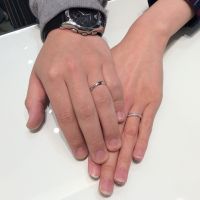
Ariyoshi will live her life without following
old textbook tastelessness etc. during her
lifetime.
Trend tracking is not frivolous.
If you can imitate buying and wearing luxurious
furs from Balencia or Givenchy in the shops,
you will be close to
the spirit of luxury I chant
.Let's enrich our minds.This is as important
as social security.
The average person cannot afford to make
more than one evening dress.
However, wearing bold patterns and styles
of clothing can make you more womanly and
ballsy.
This does not, however, fits the case of
Japanese kimonos.
.jpg)
.jpg) Kimono and dress differences
Kimono and dress differences
Clothes are just a pleasure to wear, but
kimonos occupy other parts of the house,
such as being taken in and out of the drawers
of the chest of drawers.
Ariyoshi experience the difference its.
It is Western clothes and kimonos as classic
and modern.
When it comes to kimonos, Ariyoshi admires
the tenacity of the craftsmen.
And the clothes give me a to be able to feel
the joy of life.
Kimonos have a traditional beauty. They have
been handed down from generation to generation.
・鏡と女 The Mirror and the Woman.
Ariyoshi has been married for one year.Asked
to act as matchmaker for her husband's office
mate.
The bride is very beautiful and looks very
good in her white wedding dress.
After getting married, the bride suddenly
stood in front of a large mirror.
This happened while being transferred to
the Photography Room.
She doesn't move from it.
The bridee faced the mirror and held her
own hand over her eye socket, lightly tapped
the corner of her eye
and rubbed her lips with her little finger.
Ariyoshi has the best impression of nowadays
Ariyoshi thinks she's a woman, but she's
not a fan of make-up.
But when I brush my hair and put on lipstick,
I look in the mirror.
These Ariyoshi like to look at women with
make-up.
Ariyoshi has a woman who, as soon as she
says "hello", enters someone's
house without permission and
goes into the living room, where she is greeted
with "welcome" in front of the
dressing table.
She is over 50 years old, but bathes and
puts on make-up several times a day.
even though,She is a manly businesswoman..
KInchiyouThe name derives from the Edo period when
samurai would clash the blade and tsuba of
their swords to show that
they were keeping their word. The samurai
would pull the blade or tsuba of their sword
out of the scabbard a few centimetres to
make a sound.
Monks would use a gong, and
women would bang metal objects such as mirrors
against each other as a sign of their commitment.
The mirror held by women at this time is
called a pocket mirror and is the soul of
Japanese women.
.png) Japanese women's pocket mirror
Japanese women's pocket mirror
・爪nail
When writing her novels, Ariyoshi does not
wear nail polish because it distracts her
mind.
But not her engagement ring, which she always
wears. She doesn't want the colour of the
lines on her manuscript paper to be brown.
She liked the grey lined manuscript. It is
still on display in the Sawako Ariyoshi Memorial
Museum.
.jpg)
In 1863 Ariyoshi became pregnant and after
seven months she lost her strength.
Ariyoshi stopped writing to care for her
unborn child.
This is because of the effects on the foetus
of the sleeping drug Isomin, which was launched
by Dainipponseiyaku in 1958.
Ariyoshi had an inspiration.
Had a passion for knitting or went to a hairdresser.Ariyosi
was refreshed.
She had her nails done and a facial at a
beauty salon.
"How happy I am right now!"
Her fingernails turned red.
She was so happy to learn to knit.
Ariyoshi was fascinated to see the red nails
knitting the pure white yarn.
Ariyoshi had a baby girl on 16 November 1963.
Ariyoshi has taken on the role of mother
in “Snow White”.
・NOBOYについて―Sawako began to tire herself
out both physically and mentally when she
became famous in weekly magazines.
One day, Ariyoshi was offered an invitation
by Dr Shiho Sakanishi to study in the USA.
[NOBODY-Ariyoshi want not to be famous!] [ a person of no importance]
She advised me that.
"Everyone in Japan knows you today,
but abroad you are nobody - remember that."
Ariyoshi wanted to be NOBODY. Because She
didn't want everyone to stare at her every
time she walked down the street.
But she had a different idea.
November 1959, , She was asked by a student
and a Faculty.
"Perhaps you are Ms Ariyoshi?"
.JPG)
.jpg) ‘She often goes to restaurants in Manhattan’.
‘She often goes to restaurants in Manhattan’.
Harold A. Taylor (1914-1993) was president
of Sarah Lawrence College. He is known for
his writings on education and philosophy,
and for his opposition to McCarthyism's interference
in American education.Ariyoshi studied at
Sarah Lawrence College in New York in November
1959,
Ariyoshi felt like shouting out loud
Ariyoshi aprreciate the great valu of NOBODY
After one year of study overseas.
As soon as she no longer wants to live in
Japan.
Every four years she goes to a different
country to reach freedom from Japan.
Ariyoshi moved to Chaina and Hawaii because
of Dr Sakaguchi's act of RECOMMENDING.[NOBODY]
・患者の心理ーIn the mind of the patientp192.
Having children and caring for the sick was
a painful experience for me.
When she was a patient in hospital, Ariyoshi
had the feeling that doctors and nurses...
“If I am down on my sickbed, I feel hot
when a nurse comes to my hospital room.
The nurses put on a lot of energy.
‘Don't worry, you'll be fine soon.’
Patients are either happy or saddened by
the natural colour and apperance of a hospital
officials the skin.”
I want to trust my doctor's diagnosis, but
I'm afraid I'm going to die.
I couldn't trust anyone, one nurse told me
firmly.
'You are not dying. I was a serving nurse,
I've watched patients die, so you don't have
the look of death on your face.’
This is spoken by an Angel.
I was not seriously ill, but my depression,
which had been worrying, complaining, angry
and ranting, was soon fully recovered.
I have been thinking about her and think
that old people who go to the hospital for
their ageing problems are lucky.
Because there are people without water and
electricity, without medicine and food, without
communication, without immigration
and life insurance, without the ability to
immigrate, living in fear of bombing, without
hospitals, wondering when they will be killed.
.jpg) How did Hiroshima and Nagasaki feel about
having died?
How did Hiroshima and Nagasaki feel about
having died?
.png)
・病後ーafter an illness196p.
Ariyoshi had been hospitalised for 80 days
for his fifth operation for a peri-rectal
ulcer.
She had a bad reaction to lumbar anaesthesia
during the second operation,
Also, 70 intravenous injections had nearly
collapsed her veins.
The drugs slowed down her natural reflexes,Wound
care was also hard.
Ready to cure my illness in its entirety
this time, I went to the hospital with many
books.said Ms.Sawako.
‘Sickness is a holiday, take this opportunity
to rest.’A man's words of sympathy.
However, reading is not an ideal option when
the body is dizzy after surgery due to the
administration of antibiotics.
So she had no rest or reading after the operation.
But she had been keeping up with the newspapers
and weeklies.
To find out about the marriage of Hashizo
Okawa and Mariko Sawamura from a weekly magazine.
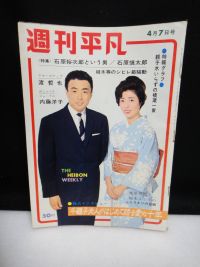 November 1966.
November 1966.
"The appeal of a weekly paper is that it's
a good read when it's impossible to read
a difficult book or one that takes up too
much time.”
Ariyosi said.
As soon as Sawako had recovered, she read
two short stories written by Ogai Mori and
she started to write a fiction,
but began to have headaches.The doctors'
warning to me was that I was still unaware
that I was a sick person.
However, after two months she walked out
of the hospital and went to a hairdresser
because her body healed less quickly than
her wounds.
”I went to a public bath for the first time
in 10 years, it's been seven years since
I stopped appearing on TV,
so people don't know me, so it was relaxing.“said
Sawako.
When a sick person is only a breath away
from being cured, doctors say it is important,
Sawako had been eating too much and like
a pig, but her brainpower began to decline.
She was constantly worried that she would
not be able to write a novel, remembering
the time when she was pregnant.
・預かり信者の弁ーThe Believer's Dialectic.201p.
Ariyoshi published a novel under the title
'Eguchi no Sato', so everyone knew she had
been a baptised Catholic.
She thought thus.(1959)
“Catholics' commandments, rules and obligations
of believers have become hard because they
are difficult to understand."
At this time, France had a labour priest.The
labour priest is・・・・・
After France's defeat by Germany in 1940,
more than 4,000 French clergymen were taken
prisoner of war by Germany.
Germany, either as prisoners of war or for
'forced labour'.
From there, there will be clergymen who want
to live alongside the workers, just as they
do.
The number of working priests in France was
25 in 1947, but by 1950 there were 50, and
by 1954 there were 100.
By 1954 the number had reached 100.
They work in Paris, Marseille, Lyon, Bordeaux,
Lille and Toulouse.
They have been active in core and industrial
cities such as
In May 1953, the Bishop of MarseillesThis
was followed in July by a papal decree directly
forbidding seminarians from working in factories.
The Pontifical Council of State issued a
direct order in July forbidding seminarians
to work in factories.
In September, Marella, the papal ambassador to France, issued a
papal decree to French bishops and abbots
to end the activities of working priests.
The Pope's decision to end the activities
of labour priests was communicated to the
bishops and abbots of France.
The French bishops also accepted this decision
and suspended their activities from 1 March
1954.
and ordered the working priests to cease
their activities from 1 March 54.
In this ... Paul Ferrer was also there.
He joined the Jesuits in 1937, when he was
23 years old.
1940, he was captured during the first war
with Germany.After the war, he resumed his
theological studies.
He resumed his theological studies and was
ordained a priest in 1947.
Ferrer was a Jesuit known for his education
and theological studies, but he also extolled
the virtues of physical labour over knowledge
and thought, and practised it himself on
a daily basis.He also extolled the virtues
of manual labour over knowledge and thought,
and practised it himself on a daily basis.
and Ferrer believed that craftsmanship was
alsois also related to differences in value
in the way the body is used,
as Ferrer believed that it restores humanity.
The use of the body is also considered to
be related to differences in value.
He had described the difference between tooling
and machining as follows.'Outil and instrument.
"The main difference between a tool and an
instrument lies in the senses.
Through the senses a fluid passes between
the material and the worker.
Through the senses there is a flow between
the material and the worker.”
・・・・・・・・・・・・・・・・・・・・ the
best policy is to keep your head down・・・・・・・・・・・・・・・・・・・・・
In Japan, monks are also used as teachers
and as monks.When I have been a junior high
school student in 1967,
there was a Japanese teacher and an English
teacher who was both a civil servant and
a monk.
After a while, however, the English teacher
left the civil service to become a monk,The
Jodo Shinshu teacher continued to teach Japanese.
He then had us memorise the Houjouki.
In contrast, the Japanese Natsume Soseki
and Minakata Kumagusu have been translated
into English, but I prefer Kumagusu's work.
"Of the flowing river the flood ever
change, on the still pol the foam gathering,
vanishig,
stay not. Such too is the lot of the dwellings
of men in this world of ours.
Within City-Royal, paed as it were with precious
stones, the mansions and houses of high and
low, rivalling in length of beam and height
of tiled roof, seem builded to last for ever,
yet if you search few indeed are those that
can boast of their antiquity.
One year a house is burnt down, the next
it is rebuilded, a lordy mansion falls into
ruin, and a mere cottage replaces it.
The fate of the occupants is like that of
their abodes,
Where they lived folk are still numerous,
but out of any twenty or thirty you may have
known scace two or three survive.
Death in te morning, birth in the evening.
Such is man's life - a fleck of forn on the
surface of the pool.
Man is born and dieth; whence cometh he,
to where goeth he ? For whose sake do we
endure, from were do we drae pleasyre?“
by.Kumakusu Minakata
and Frederick Victot Dickins 1903.
Sawako believed that
"If I continue to live in fear of guilt,
I may get to heaven, but I won't be able
to do any great good.”
She asked the act of excommunication from
the priest for this reason.
The priest looked at me strangely. He said."People
who leave the church leave without refusal,
but you are an unusual person.“
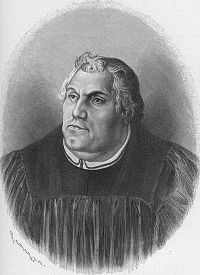
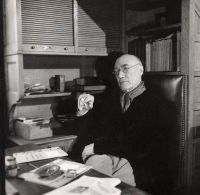
Priests have been advised that those excommunicated
are those who deny the survival of the Catholic
Church, such as Luther and Ziid and their
ilk.
(Martin Luther's New Testament owes much
to the Gutenberg printing press. Yes, it
is like the computer of the today's IT revolution.
This printing press is still in the library
of Osaka Gakuin University in Japan.)
Back to the main topic.At this time, Sawako
was in disbelief of Catholics.
Catholics are cold, self-righteous, heaven-bound,
charity-loving quiet bastards, terribly conservative.
The reason why so many Catholics are people
who are haters of communal life is because
they have been enjoying their own private
time with God.
It is therefore a hard place to brath for
those who prefer a more diverse society of
people.
Praying in a sanctuary may provide spiritual
unity, but it doesn't directly help the world.
There are so many problems on the ground
that have to be worked out.
Can Catholics be saved at a time like this?
Her thoughts on the atomic bombing of Nagasaki
Tenshudo,
Transfusion patients who have been and continue
to be transfused.
In the future,
Sawako would like to use the advantage of
having her writings in print to speak on
behalf of the victims of the atomic bombing
and others.
In the future, Sawako would like to use the
advantage of having her writings in print
to speak on behalf of the victims of the
atomic bombing and others.
This was 14 years after the Nagasaki bomb.
.jpg)
・最も身近な読者 ―Me and my sister-in-law205p.
Sawako has been a founder of the elder brother's
wife's custom.
She reads the newspaper silently after dinner.She
is reading the fiction section in the newspaper.
Swako asked "How many have you read.”She
responds."Eight.“
One of them was my piece.
Sorry.
Sorry, this word. This word is used when...
Use this word when... This word would be
used in these situations.
Sawako ask “8 Will the works be mixed?”She
answer “The eight works are different.
They do not mix.”
Sawako ask ”What a difficult task!“ She
said "But if I miss even one day, it's
hard."
She did a good a job of capturing the eight
piece's main characters, and she didn't forget
the odd name.
Sawako got hints from her when deciding on
the names of the characters in the novels
she writes.
Sawako wanted her to advise me on my work.awako
wanted her to advise me on my work.
She didn't want to.
“I have no interest in the lives of writers,”
Japan's elder brother is played by the elder
brother's wife.
Look after Sawako's food.、Giving Sawako
a cup of tea.
Sawako has taken them for granted because
they are family.So Sawako thought this wasn't
the reason.
Sawako had been a writer for two years when
she developed a dislike for her family's
literary circles.
Sawako began to tire herself out both physically
and mentally when she became famous in weekly
magazines.
When Swako lived in the USA for a year in
1959, from the age of Sawako 28, she could
heal that neurosis, as she wrote in NOBDAY
189p.
Sister-in-law is a grateful person. She reads
Sawako's work. She doesn't ask her to do
so.
本を語る ―Talking about the book.
・わが文学の謡籃期ー(偶然からの出発)My
literary incubation period.ーBeginning by
Chance212p
Sawako was 5-12 years old when she had been
in Jakarta.
Meanwhile, she had read the complete works
of both Takeo Arishima and Soseki Natsume.Those
were the books that my father sat on.
Sawako was so moved by Kojin. She walked
around with the complete works of Soseki
in her arms.
Sawako's father had been one of Takeo Arishima's
students.
Dad had valued Whitman's books of poetry
and Arishima's books.
This collection of poems has now been taken
possession of by Sawako.
When Sawako saw her dad, he seemed to honour
Natsume Soseki more than Arishima Takeo.
.jpg) Arisima
Arisima .jpg) Natsume
Natsume
.jpg) Madame Curie was read by Sawako in the third
grade of primary school.
Madame Curie was read by Sawako in the third
grade of primary school.
Sawako says to her parents that she will
be a world-class scientist in the future.
A lot of scientific books had to be imported
from Japan by the parents.
Sawako's ancestors were leaders of loom weavers,architect,Scientists.
Therefore, her parents hoped that Sawako
would be gifted in science.
But, her path to becoming a scientist was
interrupted. She was evacuated to Wakayama
because of the war.
That's why Sawako has nothing to do with
literature until she was a college student.
This would become the subject matter of”
KINOKAWA” written by Sawako.
What Sawako learned while living in Wakayama
・The 18th-century accent and grammar are
taught in the text as part of the British
Imperial History curriculum.
Here's one she had to learn from her grandmother.
・Other Chinese literature was also taught
by a tutor. But the most joy was the time
spent reading her uncle's philosophy books.
After the war, she had become haunted by
the Kabuki she had seen with her father.And,
A step towards writing under the guidance
of Koichi Toshikura.
He had been a student of Ariyoshi's for three
years in a row and kept a series of regular
articles written by her.
Ariyoshi was so pleased with the enjoyment
of seeing his writing in print that she had
to work hard at this part-time job.
Sawako had been on her way back from studying
in the USA after writing ‘Ki no Kawa’,
and also stopped off in the UK.
Sawako visits Chrztofer Fry in London.
She put down her pen and after a year's experience,
Sawako had been decided to become a writer.
.jpg) Christopher Fry
Christopher Fry
Sawako got her inspiration for her plays
and other styles from him, and this inspired
her to write them.
1.jpg) 『身代わり』へのリンク
『身代わり』へのリンク
・我が家のライブラリアンーOur household librarian
My house is overflowing with books spilling
out from the library.when the house was built,
a fireproof and earthquake-resistant library
was also constructed.
It is not known what books were contained
within the earthquake-resistant and fireproof
archive room.
The books I have sought, complimentary copies,
complete works, magazines, and manuscripts
are piled up in the hallway, living room,
and tatami room.
While my mother was organising the books,
she noticed there were three copies of the
same book.

This house was built when I was single, so
I hadn't planned for when children came along.
I moved the study to the bedroom when the
study became Tamao's study room.(Well-versed
in Tamao's “substitute”)
The shop assistant at the bookshop recommended
a book to my mother, who then went and bought
it. The bookshop sold both new and second-hand
books.
I bought a 150-volume set about my parents'
relationship, but as I'll never read it,
I'm thinking of selling it.however, it was
six times the price I had paid. So I decided
not to sell it.
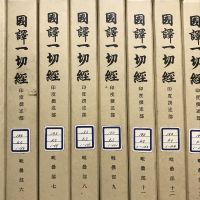 The Kokuyaku IssaikyM (National Translation
of the Entire Buddhist Canon) is a Japanese
translation of the Chinese Mahayana Buddhist
canon published by Daito Shuppansha. Based
on the TaishM Shinshk DaizMkyM (Revised TaishM
Edition of the Buddhist Canon), it selects
major Buddhist scriptures for compilation
and translation into Japanese.
The Kokuyaku IssaikyM (National Translation
of the Entire Buddhist Canon) is a Japanese
translation of the Chinese Mahayana Buddhist
canon published by Daito Shuppansha. Based
on the TaishM Shinshk DaizMkyM (Revised TaishM
Edition of the Buddhist Canon), it selects
major Buddhist scriptures for compilation
and translation into Japanese.
〇岡本かの子『生生流転』
I was in poor health and lived abroad, so
I read a lot of books.I found the book my
parents were reading and read it.
The works of Mori Lgai, Natsume SMseki, Kikuchi
Kan, Yoshikawa Eiji, and Arishima Takeo were
read during my primary school years.
Since returning to Japan, I have been reading
philosophical works.Kant, Schopenhauer, Perjaev,
Karl Marx.
During my fourth year at university, I encountered
the works of Kanoko Okamoto.
Having finished reading her work, I had been
astonished.
Over the next decade, I continued reading
Kanoko Okamoto's works.
for details on the Tower of the Sun, please
refer to the previously linked "Photographs
of the Tower of the Sun".
〇男性社会の中でーIn a man-centred society
April 1978: Publication of 'Princess Kazunomiya's
Detention'-The accounts of the late samurai era were
written by court scholars, but I took issue
with them.In September, “On Wicked Women” was published.-I wrote for both the weekly
magazine and the television drama series
at the same time, but from now on I won't
be writing novels for the weekly magazine.and
then there's "The Last Colony". That was serialised in Croissant.-This
book contains a detailed examination of discrimination
against women in general.
-Even women who despise fighting women benefit
from the women's liberation movement. I want
them to know this, and to feel it. For what
I wish to write is a book about friendship?no,
rather, a book about something that does
not yet exist, something not even found in
dictionaries, something that, if it must
be named, should be called “women's friendship”:
a book about a certain feeling and a certain
word.戦う女たちを忌み嫌う女性でさえ、女性解放運動の恩恵に浴している。私は彼女たちにそのことを知ってもらいたいし、感じてもらいたい。なぜなら私が書きたいと思っているのは友情の本、いやむしろ、いまだに存在していないものについての本、辞書にさえ載っていないような、もし呼ぶとするならば《女性の友情》と呼ぶべき、ある感情と言葉の本だからである。
Chapter 1: Endless Servitude第1章 果てしない隷属We must recover from having been women all
this time. We were not born women; we were
raised as women within a man's world, living
each stage, each scene of our lives through
a man's eyes.私たちは、これまでの女であることから立ち直らなければならない。私たちは女に生まれたのではなくて、男の世界の中で、女として育てられ、男の目で、私たちの人生の一段一段を、一齣一齣を生きてきた。We must rectify this. To recover, it is not
enough to keep reading men's books and listening
to what they have said for centuries in the
name of women's happiness.それを直さなければならない。私たちが立ち直るには、男の本を読み続け、何世紀にも渉って女の幸福と称して、彼らが言ってきたことを聞き続けることでは駄目だ。We are beginning to tire of becoming mere
tools for men, becoming traitors to our own
kind, forgetting our own truth and interests
to serve the truth and interests of the male
side.男の手先となり、同性への裏切り者となり果て、自分自身の真実と利益を忘れて、男性の側の真実と利益に仕えることに、私たちはもううんざりし初めていると言えるのではないか。第2章 編物庁次官としてA man derives his dignity and security from
his profession. A woman can obtain both through
marriage. Jean Foyer, Minister of Justice,
France, February 1973.-President de Gaulle
once asked a member of parliament who proposed
creating a minister for the advancement of
women: ‘A woman as a minister? Wouldn't
a deputy director of the knitting bureau
suffice?’第3章 だが、雑巾は燃えにくい第4章 お×××への憎しみDo you know, ladies?Did you know that in
Egypt, that land celebrating free civilisation,
the clitoris of every female mummy unearthed
had been excised? Of course, neither Tutankhamun's
beautiful wife Nefertiti nor Cleopatra were
exceptions.Do you know that in Yemen, in
Saudi Arabia, in Ethiopia, the removal of
the “little girl” is still being performed?
In Egypt, a ritual known as Kifad is still
practised today, involving the removal of
the clitoris. In rural areas, this procedure
is performed on all girls, while in urban
centres, it is carried out on the majority
of girls.Among the Dogon people of Guinea,
Iraq, Jordan, Syria, Ivory Coast, and Niger,
it is frequently practised; among many other
African tribes, it is obligatory.
Sudan, Somalia..To prevent their wives from
having sexual intercourse with men other
than their husbands, a truly bizarre genital
sealing operation is being performed. ……The
bride is generally between twelve and fifteen
years old, and the girl's crotch is cut open
with a razor, after which the husband passes
through.Her surviving perineum has lost its
elasticity, becoming a cause of sclerotic
changes, and during childbirth it causes
lacerations.For a woman subjected to such
torment, what indeed is the act of love?
Moreover, this did not mean everything was
exempted. After childbirth or during extended
travel, suturing surgery would be performed
again at the husband's request!第5章 母は聖女でした!The history of women's liberation in Japan
? the transition from oppressive feudal constraints
to fulfilling lives in the 20th century ?
was largely achieved through Japanese women's
magazines. The founding of these magazines
originated from the movement around 1920
that sought to secure young women's right
to refuse husbands with syphilis.In 1921,
Ms Raiteu Hiratsuka spearheaded the promotion
of the “Campaign Against Marriage with Venereal
Disease Sufferers”. This occurred during
the golden age of the Japanese women's movement,
as documented in the New Women's Association's
journal and publications such as “Seito”.
‘My mother? Yes, she was a saint.’This
has been stated by former US President Nixon.How
many sons, beginning with Christ, have uttered
these words throughout the ages without a
trace of remorse?If only they were slightly
more intelligent, considerate men, they would
explicitly state: “my poor mother”.第6章 暦もハーモニカもなくAmong all attempts to disparage women's functions,
the most lamentable, the worst masterpiece
is the history of childbirth.Men found childbirth
too filthy to contemplate.Midwives have been
the only human beings attending women in
labour for centuries.Even a birth without
complications... was often a dreadful ordeal.The
midwife had to work by touch beneath the
labouring woman's skirt,When labour became
excessively prolonged, the only solution
was a dreaded operation that required tremendous
strength and dexterity.The child was dismembered
inside the womb and scraped out with various
hooks.The Church compelled the view that pregnant
women were merely trustees of new life, more
precious than the mother's own life.(This has influenced Japanese civil law)As
a result, the church requested that the mother's
womb be cut open to extract the living child.This
was tantamount to a death sentence for the
mother. Despite this, religious councils
and diocesan synods repeatedly invoked such
prescriptions.Everyone died.第7章 真夜中のホテルマン第8章 紅くて、それから愉しくて第9章 蛇口の問題The research paper titled ‘The Pressure
of Discriminatory Childcare’ contains some
astonishing findings.「Taking mothers with
both sons and daughters as an example, thirty-four
per cent of mothers with daughters give convoluted
reasons for not breastfeeding.Meanwhile,
ninety-nine per cent of mothers with sons
are breastfeeding.Feeding times were invariably
longer for boys than for girls, with boys
receiving forty-five minutes of feeding time
at two months old compared to twenty-five
minutes for girls.」According to works such
as “Psychology of Early Childhood Education”,‘The
self-confidence and pride that are often
extremely rare in girls yet manifest as highly
pronounced in boys are clearly determined
by the degree of physical affection a mother
shows towards her child.’第10章 二人のために世界はあるの
The world has reached a point where it cannot
afford to become any worse due to mans power.
So let's get women involved sooner.
The woman is nearby, close to the fountain
that nourishes her descendants.
It is precisely because women have endured
misfortune for so long periods that they
possess the capacity to perceive happiness.
At the very least, they possess that flash
of insight which might even be called sacred.
(ブノワット・グルー著、有吉さんとカトリーヌ・カドゥの共訳の評論である。テーマは「女性差別」。「最後の植民地」とは、女性のことをさす。)
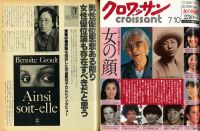 1979年7月10日号「『最後の植民地』を翻訳した有吉佐和子さんにインタビュー」より
1979年7月10日号「『最後の植民地』を翻訳した有吉佐和子さんにインタビュー」より
'On the Wicked Woman' had been written the year before its series
of weekly magazine and television instalments.
In writing this work, I have imitated the
works of Akutagawa Ryknosuke.The title of
the work is “In the Thicket”.
A thicket in the Heian period is the setting
for a murder and rape that is the focus of
a bundle of confessions written by four witnesses
and three parties involved.
The testimonies are not helpful in relation
to the case due to their inconsistencies.
The perpetrator has not been apprehended.
This story influenced the use of the phrase
“The Incident in the Bushes” in Japan.
Akutagawa Ryknosuke's “In the Thicket”is
composed of three statements, whereas “On
the Wicked Woman” features twenty-seven.this
was done to keep readers and viewers in the
series engaged by introducing a different
character in each of the 27 instalments.
Moreover, my aim is to understand how everyone
felt about this work,
Having finished reading, I was looking forward
to the reactions regarding whether the protagonist
had committed suicide or been murdered.
Another aim was to express the woman's desires.
The protagonist, Kimiko, commits some evil
deeds, but these are the very things I wanted
to do.I had written down all the misdeeds
of the women who lived in this era.
Kimiko has made love to several men and given
birth to two children, but it is unclear
whose DNA they possess.
Can you all figure it out?
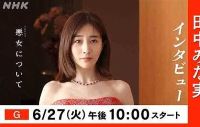

The men.They share the same bed. But they
dream different dreams.
Even if I had reached out, I would have been
able to touch her slippery skin and the scar
from her appendectomy.
Within this woman's heart, things uglier
than blood plasma or faeces and urine cannot
be foreseen.
With a swift movement of her head, her pouty
lips, painted with lipstick, parted to reveal
her ears, engulfing the men in one fell swoop.
The man showed his foolish love to the woman.The
man was betrayed by the woman before he had
the chance to defend himself.


For a while I shall mourn
Conservative political activist Charlie Kirk
was assassinated by an unknown assailant
on the 10th while in attendance at an event
at a university in Utah, in the western United
States.
The perpetrator fled the scene. However,
on 11 September, the FBI released images
of individuals believed to be of interest
in connection with the incident on social
media.
It is reported that rifle bullets bearing
inscriptions indicating transgender identity
and anti-fascist ideology were left at the
scene.
Mr Kirk founded the conservative organisation
Turning Point USA in 2012, when he was just
18 years old. Since then, he has worked tirelessly
to promote conservative values among young
people.
The organisation had expanded its reach by
touring universities and other institutions
across the country, campaigning against abortion
and for the right to bear arms. According
to its website, it was then active on over
3,500 campuses nationwide.
In June of this year, an incident occurred
in the Midwestern US state of Minnesota in
which two Democratic state legislators and
their spouses ? a total of four people ?
were shot at their respective homes, resulting
in the deaths of two of them.
The news on the TV last night informed me
of the suspect's arrest.At that moment, I
recalled the scene of President Kennedy's
assassination on 22 November 1963.
The television news showed the sniper shattering
the President's skull and splattering his
brains across the rear of the open-top car.
Mrs Kennedy was shown rushing towards him.
At this point, my father muttered."Americans
are great shots."
During the period of American occupation
of Japan, there were brothels in Wakayama
City that catered for white and black soldiers.
Black soldiers had a blast at TennMshinchi,
while white soldiers played at Hanwa Shinchi.
At the entrance to Hanwa Shinchi, a small
stream flowed beneath a bridge where a MP
had stood.My father ran a bicycle shop next
door.
One day here, a black soldier came along
smoking a cigarette and got into an argument
with a MP.
Apparently, a MP told the black soldiers
'No!' when talking to them about TennMshinchi.
Nevertheless, the black soldier ignored a
MP's warning and attempted to enter the brothel.
At that precise moment, a MP shot the cigarette
from the mouth of a black soldier with a
pistol.
"Americans treat guns as toys; seeing
this, one can understand why Japan lost the
war."My father said.
May His memory last foreever.
〇嫁姑の争いは身は醜くない
Ariyoshi Sawako is dissatisfied that her
novel “The Wife of Hanaoka Seishu” is being
used in a parody about people who “have
a house and a car but no grandmother”.Ariyoshi
speaks. ① All people possess the ability
to reproduce, and a man having a wife is
for the purpose of producing children.②Eventually
his wife gave birth, and their child married
and bore children. Their descendants continued
through the first, second, and third generations
of hybrids, following Mendel's laws.
I dramatised “Han'M Seishk's Wife”.
In the audience, a man watched the quarrel
between his wife and mother-in-law. He looked
sorrowful.
The woman had enjoyed watching the quarrel.My
work helped to relieve their daily stress.
Ariyoshi has said:
Generally speaking, the wife's workplace
is the kitchen.Here I see a quarrel between
wife and mother-in-law.
Within the company, men will exhaust every
stratagem in their quest for the presidential
chair.
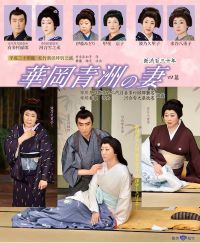 Eighty years after the Second World War,Babies
born at the time of defeat are now very old.
Eighty years after the Second World War,Babies
born at the time of defeat are now very old.
In Japan, these children are referred to
as “children who have not known war”.
However, the post-war world has witnessed
repeated massacres of humanity, including
the Korean War, the Vietnam War, the Iran-Iraq
War, and conflicts in Ukraine and Gaza.These
are all global public works projects.Therefore,
war will never cease. Even when one war ends,
another begins somewhere else.
After the war ended, we were born.We grew
up without not knowing a war.
Now I begin my journey.Whispering songs of
peace
Please do not forget our names.Japs who have
never known war
If I am not allowed to because I am too young,
If having long hair isn't allowed,
All that is left for me to do now is...
I shall pray only for the safety .
Even in such a peaceful Japan, Japanese housewives
are likely to be forced to endure all manner
of hardships for the sake of domestic harmony.
〇原作・兼・脚色の弁―「地唄」
When I wrote a novel and a play at the same
time、
I had thought these two had different points
of origin for their ideas, but now I'm not
so sure.
I ended up adapting the play of 『 Jiuta.』.
So might plays then be seen as novels, and
novels as plays?
〇私の阿国
Popular legends were the main inspiration
for Ariyoshi's work on "Okuni of Izumo",
since there were not many primary sources
available.
The story is about Okuni and the Nenbutsu
dance.The Nenbutsu dance became popular during
the Kamakura period and continues to this
day.
In ethnography, this is referred to as “furiu-”.「風流」
.jpg)
On 30 November 2022, it was inscribed on
the UNESCO Intangible Cultural Heritage list
as one of the “Furiu- Odori” dances.The
MushMno Daienbutsu Preservation Society performs
it over two evenings: around the 16th day
of the first month of the lunar calendar
and on the 16th day of the eighth month of
the solar calendar, at the MushMno Community
Centre.
In her bestseller “Kinokawa”, Kudoyama
is that place.Of course, it has also been
preserved in Wakayama, where Ariyoshi was
born.
According to research by Mr Fujimori, curator
at Wakayama Prefectural Kii Fudoki no Oka
Museum,
・This folk art form embodies the spirit
of 'furu-' ? being splendid and eye-catching
? and features performers dancing to song
accompaniment and the sounds of bells, drums
and flutes, while displaying elaborate costumes
and accessories.The Furiu- Dance is a folk
art performed in various regions. It embodies
the vibrant and eye-catching spirit of 'furiu-'
to ward off calamity and ensure a peaceful
life .from the ‘Summary of the Agency
for Cultural Affairs Proposal’
.jpg)
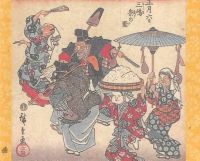
In Wakayama Prefecture, they are to be found
in Koya Town and Kudoyama Town. Incidentally,
smoking was prohibited on Mount Koya.
.jpg)
.jpg) Hosokawa's Umbrella Float Festival -
Hosokawa's Umbrella Float Festival -
Koya Town Board of Education 26-5 KMyasan,
KMya Town, Ito District, Wakayama Prefecture
648-0211 Telephone: 0736-56-3050 Fax: 0736-56-4831
The festival is held annually on 16 August
and features demons carrying parasols and
bamboo poles.The core ritual implements,
including a demon mask believed to date from
the Muromachi period, as well as mask boxes,
parasol pole curtains, curtain boxes and
parasol pole handles, have all been preserved.
Together, these items provide invaluable
insight into the nature of refined performing
arts at the foot of Mount KMya.
The reason Ariyoshi had written 'Izumo no
Okuni' Kabuki and courtesan dance were strictly
distinguished, with the former established
as small-scale individual businesses and
the latter as large-scale business .Okuni
is the former.Ariyoshi said that Okuni was
born on the banks of the Hii River in Izumo.
The term 'tatara' was used broadly to refer
not only to the iron-making method itself,
but also to the bellows, the furnaces and
the buildings that housed them. Okuni's father
was a tatara.
.jpg)
.jpg)
 1954年― 吾妻一座渡米。 ニューヨークなど7つの都市で『アズマ・カブキ』を銘打った歌舞伎スタイルの舞踏劇を上演。その後 は、1956年まで欧米十数カ国・四十数都市で公演した途中の出来事である。
1954年― 吾妻一座渡米。 ニューヨークなど7つの都市で『アズマ・カブキ』を銘打った歌舞伎スタイルの舞踏劇を上演。その後 は、1956年まで欧米十数カ国・四十数都市で公演した途中の出来事である。
.jpg)

.jpg)








 【The Wazoku Doji Kun is an educational treatise
written by Kaihara Mashiken in the Edo period.】
【The Wazoku Doji Kun is an educational treatise
written by Kaihara Mashiken in the Edo period.】.jpg)


.jpg)
.jpg) Kimono and dress differences
Kimono and dress differences.png) Japanese women's pocket mirror
Japanese women's pocket mirror.jpg)
.jpg) ‘She often goes to restaurants in Manhattan’.
‘She often goes to restaurants in Manhattan’..jpg) How did Hiroshima and Nagasaki feel about
having died?
How did Hiroshima and Nagasaki feel about
having died?.png)
 November 1966.
November 1966.

.jpg)
.jpg) Arisima
Arisima .jpg) Natsume
Natsume.jpg) Madame Curie was read by Sawako in the third
grade of primary school.
Madame Curie was read by Sawako in the third
grade of primary school..jpg) Christopher Fry
Christopher Fry1.jpg)

 The Kokuyaku IssaikyM (National Translation
of the Entire Buddhist Canon) is a Japanese
translation of the Chinese Mahayana Buddhist
canon published by Daito Shuppansha. Based
on the TaishM Shinshk DaizMkyM (Revised TaishM
Edition of the Buddhist Canon), it selects
major Buddhist scriptures for compilation
and translation into Japanese.
The Kokuyaku IssaikyM (National Translation
of the Entire Buddhist Canon) is a Japanese
translation of the Chinese Mahayana Buddhist
canon published by Daito Shuppansha. Based
on the TaishM Shinshk DaizMkyM (Revised TaishM
Edition of the Buddhist Canon), it selects
major Buddhist scriptures for compilation
and translation into Japanese.




 Eighty years after the Second World War,Babies
born at the time of defeat are now very old.
Eighty years after the Second World War,Babies
born at the time of defeat are now very old..jpg)
.jpg)

.jpg)
.jpg) Hosokawa's Umbrella Float Festival -
Hosokawa's Umbrella Float Festival -.jpg)
.jpg)